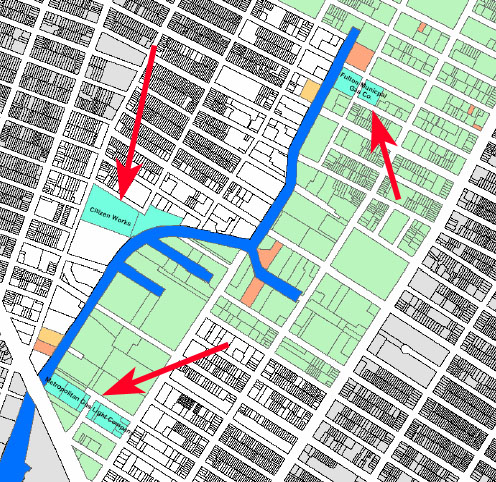
If you’re like most people, you probably only know about the old industrial art of making gas from coal at Manufactured Gas Plants, if you live near where one was located. Maybe you’ve read about manufactured gas in the context of so-called “Public Place” on Smith Street. Even so, the odds are very good you don’t know about the one that used to be where the Lowe’s and Pathmark are today or the one where the Thomas Greene Playground is. You probably don’t know about at Kent Avenue and N. 11th Street where the Williamsburg Gas Light Company used to be, either. They’re of interest because when the plants (which created gas from coal before it was replaced by natural gas) were rendered obsolete by the 1960s, they left behind a toxic stew of substances underground, most of which haven’t been cleaned up. There were 23 such plants in Brooklyn, everywhere from Coney Island to Greenpoint. The Department of Environmental Conservation has an entire section on its website devoted to the plants, contamination and cleanups.
Nationally, there were more than 50,000 manufactured gas plants. Here’s what they left behind (and what’s sitting under “Public Place” at depths of up to 150 feet) according to a site devoted to Manufactured Gas Plants:
Manufactured (or artificial) gas was made primarily from coal, as well as many other organic feedstocks. During the gas manufacture, tars were created and leaked, spilled or discharged to the environment. These tars are not susceptible to natural degradation and therefore have lives that will extend into geologic time. Manufactured gas plant wastes do not “go away.”
The tars are made up of 500 to 3000 different compounds, typically toxic to humans, mammals, and plant life. Sometimes carcinogenic, these tars are more dense than water, thus tending to sink into the groundwater environment where they contaminate passing ground water. Tar is not to be considered equivalent to asphalt, which is a residual of natural petroleum deposits and of oil refineries. Also associated with gas manufacturing were captured impurities such as ammonia, cyanide, sulfur and heavy metals, particularly arsenic.
There were three plants in Gowanus, indicated in blue on the map above. The Metropolitan Gas Light Company site is the current Lowe’s and Pathmark, it was partly cleaned, but significant toxins are still beneath the surface. The Citizen Works parcel is the “Public Place” site, which is the subject of a current development and cleanup discussion. The Fulton Municipal Gas Company site is the site of Thomas Greene Park and playground. The extent of the contamination there has not even been determined.
(The original map above is from the Gowanus Canal Community Development Corporation‘s Comprehensive Plan for Gowanus.)
Related Post:
Gowanus Parcel Detox Strategy Released

1 response so far ↓
1 Z. Madison // Mar 8, 2007 at 9:29 am
i live one block from the 5th/smith st. site. i’d be very curious as to the health effects of my 8 year proximity. any web links for that?